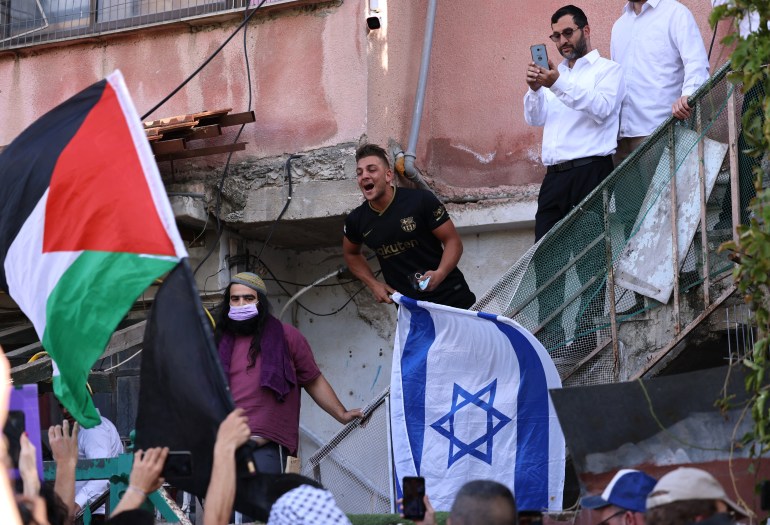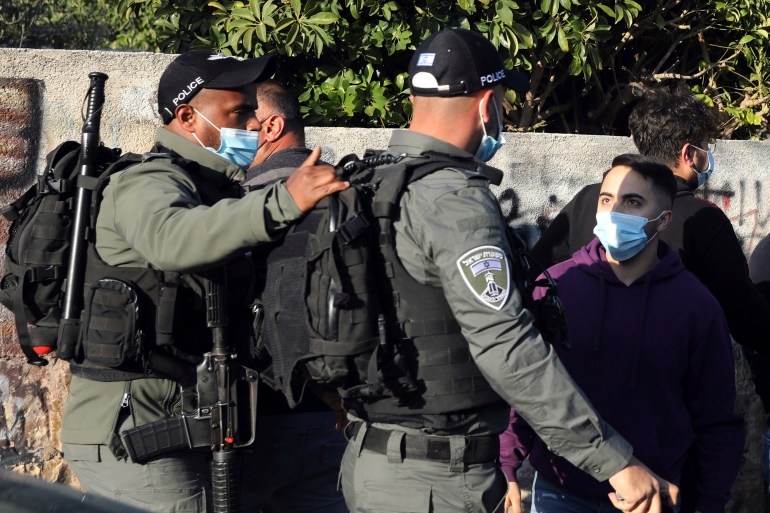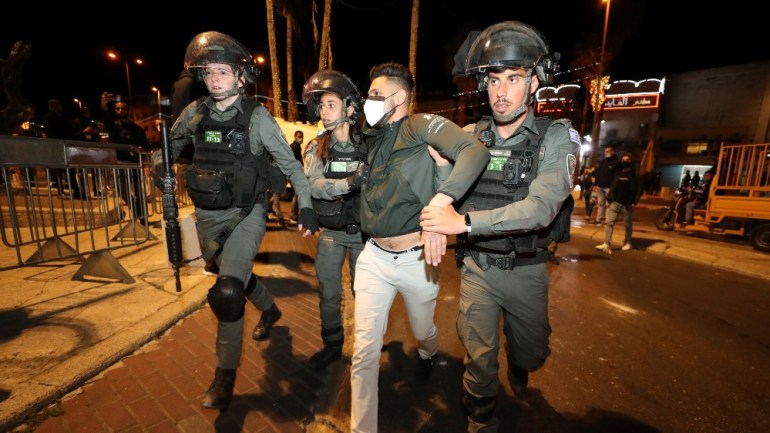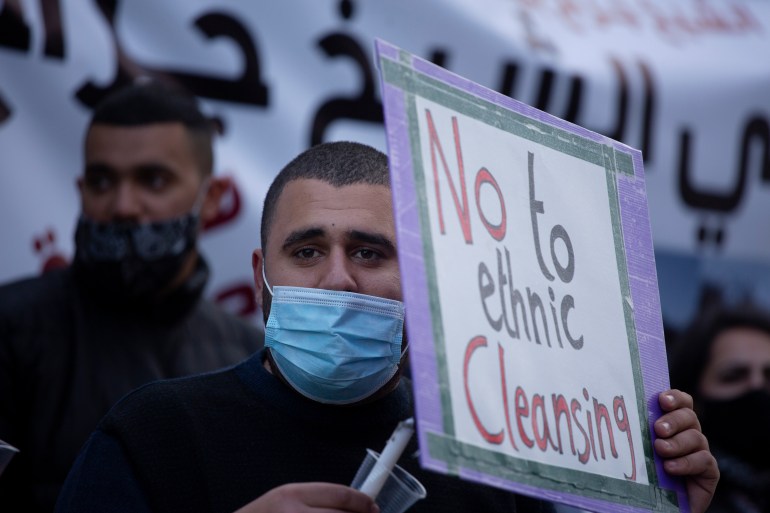What is happening in occupied East Jerusalem’s Sheikh Jarrah?
Israel ordered six Palestinian families to leave their homes in Sheikh Jarrah on May 2 to make way for Jewish settlers.

Dozens of Palestinians are facing imminent dispossession from their homes in the occupied East Jerusalem neighbourhood of Sheikh Jarrah, in what they say is a move to force them out and replace it entirely with a Jewish settlement.
The Jerusalem District Court ruled at least six families must vacate their homes in Sheikh Jarrah on Sunday, despite living there for generations.
Keep reading
list of 4 items‘My home is destroyed’: Silwan residents face new demolitions
Returning to life in Jerusalem
The US cannot continue ignoring Israel’s crimes in Jerusalem
The same court ruled seven other families should leave their homes by August 1. In total, 58 people, including 17 children, are set to be forcibly displaced to make way for Jewish settlers.
The court rulings are a culmination of a decades-long struggle for these Palestinians to stay in their homes. In 1972, several Jewish settler organisations filed a lawsuit against the Palestinian families living in Sheikh Jarrah, alleging the land originally belonged to Jews.
These groups, mostly funded by donors from the United States, have waged a relentless battle that resulted in the displacement of 43 Palestinians in 2002, as well as the Hanoun and Ghawi families in 2008 and the Shamasneh family in 2017.

What is the story of Karm al-Jaouni in Sheikh Jarrah?
In 1956, 28 Palestinian refugee families displaced from their homes in the coastal cities of Yafa and Haifa eight years prior eventually settled into the Karm al-Jaouni area in Sheikh Jarrah.
The West Bank, including East Jerusalem, at the time was under the mandate of Jordan, which struck an agreement with the UN agency for refugees (UNRWA) to build housing units for these families. The deal stipulated the families were to renounce their refugee status in return for land deeds signed in their names after three years of living in the area.
However, that did not take place and in 1967 Jordan lost its mandate as East Jerusalem was occupied by Israel.
Khalil Toufakji, a Palestinian cartographer and expert on Jerusalem, said he travelled to Ankara in 2010 to search in the Ottoman-era archives for a document that negates any Jewish ownership of Karm al-Jaouni.
“I found the deed and presented it to the Israeli district court, which promptly rejected it,” Toufakji told Al Jazeera.
After more digging, Toufakji found out in 1968 that Israel’s parliament, the Knesset, issued a decree – signed by the finance minister at the time – which stated Israel was bound to the Jordan-UNRWA agreement.
“This fact is what has been raised to the Jerusalem High Court on behalf of the Palestinian families in Sheikh Jarrah,” he said, but added there is little reason to believe the court will rule in favour of them.
“Israeli courts – judge, jury and legislation – are all in the service of the Jewish settlers,” he said.
How do Palestinians see the role of the Israeli courts?
Under international law, the Israeli judicial system has no legal authority over the population it occupies.
Last month, an appeal by Palestinian human rights groups to the UN Special Procedures said Israel’s discriminatory legal foundation “provides the basis for its creation of an apartheid regime over the Palestinian people as a whole”.
“Not only has Israel unlawfully extended its domestic civil legal system to occupied East Jerusalem, but proceeded to enact more discriminatory laws and policies that enforce the confiscation of Palestinian property in East Jerusalem in favour of settlers, the forcible transfer of Palestinians, and the expansion of Israeli-Jewish presence in the city,” the appeal said.
Fayrouz Sharqawi, global mobilisation director for Grassroots Jerusalem, previously told Al Jazeera it is “absurd” to count on the Israeli judicial system to protect Palestinian rights.
“This system is an integral part of the Zionist colonial state, which identifies as a ‘Jewish state’ and accordingly and systematically oppresses, dispossesses and displaces Palestinians,” she said.
What has been the response of Jordan?
On Thursday, Jordan’s Ministry of Foreign Affairs said it handed over 14 official documents related to building the housing units in Sheikh Jarrah to the Palestinian Authority (PA).
The documents show the development ministry at the time entered into an agreement with the UNRWA to build 28 housing units for the Palestinian refugee families.
The official spokesman for the ministry, Daifallah al-Fayez, said in a statement that Jordan is committed to providing all possible backing to the Palestinians living in Sheikh Jarrah.
“Keeping Palestinian Jerusalemites rooted in their land is a national principle in Jordan’s efforts to support our Palestinian brethren,” he said.
According to Zakariah Odeh, the director of the Civic Coalition for Palestinian Rights in Jerusalem, Jordan should exert more effort to safeguard the current and future situation for the Karm al-Jaouni families.
“Jordan does hold responsibility in resolving this issue, as these Palestinian families carried out their end of the agreement, which was to give up their refugee status,” he said.
“There are plans to build 255 settlement units in place of the Palestinian homes,” he continued. “Jordan owes it to the dozens of families who are threatened with displacement and should intervene on a political and diplomatic level.”
How is Israel’s policy of displacement linked to its occupation strategy in occupied East Jerusalem?

Israel’s annexation of East Jerusalem is largely not recognised by the international community.
Israel’s settlement project, which is aimed at the consolidation of Israel’s control over the city, is also considered illegal under international law.
About 200,000 Israeli citizens live in East Jerusalem under army and police protection, with the largest single settlement complex housing 44,000 Israelis.
“Sheikh Jarrah is but one example of what is happening to Palestinian neighbourhoods in Jerusalem regarding forced displacement,” Odeh said.
“Last year was the highest rate of settlement expansion in the East Jerusalem on record – about 4,500 units. The year 2020 also saw 170 Palestinian structures demolished, including 105 homes, which resulted in the displacement of 385 people.”
According to Toufakji, the Israeli policies of arrests, demolishment of structures, land confiscation and forced displacement are all in accordance with the Israeli government’s “demographic balance” in Jerusalem at a 70-30, limiting the Palestinian population in the city to 30 percent or less.

“This plan has been in place since 1973, when then prime minister Golda Meir gave the green light to the Gavni Committee to achieve this ratio,” he said.
“And in 1990, Ariel Sharon – who was the minister of housing construction at the time – set in motion the plans to build settlement blocs right in the middle of Palestinian neighbourhoods in Jerusalem, in order to encircle, fragment and disperse the Palestinian residents.”
Odeh said all of these policies are in line with Israel’s so-called “Greater Jerusalem” plan, which aims to cut off the surrounding Palestinian neighbourhoods of East Jerusalem from the city by way of the separation barrier and annexing surrounding Jewish settlements.
“As a result, some 140,000 Palestinian Jerusalemites live outside the separation barrier, and cannot access the city,” he said.
“The past year also saw the approval of expanding existing settlements in occupied East Jerusalem such as Givat Hamatos on Beit Safafa lands and [Har Homa] settlement on Jabal Abu Ghneim in the south near Beit Sahour,” Odeh continued.
Several Palestinian neighbourhoods in East Jerusalem are also facing the threat of forced displacement.
“The al-Bustan area in Silwan, which is south of the Old City, has 119 families in 88 buildings that are under threat of demolishment to make way for an Israeli archaeological park,” Odeh said.
“In Wadi Yasul, 84 homes are also under threat of demolishment to make way for expansion of an Israeli national park. And in Batan al-Hawa, 700 people are slated to be forcibly displaced because the Ateret Cohanim settler group said Jews used to live there before.”

What has been the international response to Sheikh Jarrah?
Last February, 22-year-old Mohammed el-Kurd, whose family faces displacement on Sunday, managed to successfully lobby 81 UK lawmakers, including Jeremy Corbyn, to sign a letter regarding the situation in Sheikh Jarrah.
In April, at least 190 organisations wrote a letter to the prosecutor of the International Criminal Court, urging her to investigate the imminent forced displacement of families in Sheikh Jarrah as part of her continuing investigation into war crimes and crimes against humanity in Palestine.
In the past few weeks, the hashtag in English and Arabic #SaveSheikhJarrah has been circulating on social media, aimed at raising awareness and piquing interest on a grassroots and official level at the imminent displacements.
Palestinian activists have called on international leaders and advocates to pressure Israel to end what they say is Sheikh Jarrah’s “ongoing Nakba”.